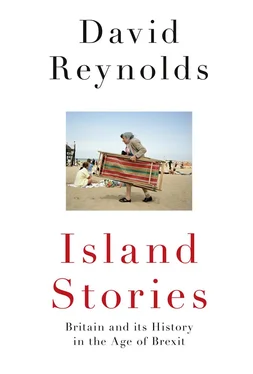When continental states once more resorted to war as an instrument of policy – resulting in the unification of Italy and then Germany between 1859 and 1871 – Britain could do little to affect the outcome. Its trump card, the Royal Navy, was largely impotent in the face of fast-moving crises in the hinterland of Europe, and the British did not adopt the continental practice of large standing armies sustained by military conscription. In 1871, during the Franco-Prussian war, Lord Salisbury reckoned that whereas the Austrians and the Germans could each put over a million men into the field, and the Russians 1.5 million, Britain’s ‘utmost strength’ for ‘foreign action’ was 100,000. Little wonder that Otto von Bismarck, the Prussian chancellor, reportedly scoffed that if the British army landed on the German coast, he would send the local police force to arrest it. [49] Конец ознакомительного фрагмента. Текст предоставлен ООО «ЛитРес». Прочитайте эту книгу целиком, купив полную легальную версию на ЛитРес. Безопасно оплатить книгу можно банковской картой Visa, MasterCard, Maestro, со счета мобильного телефона, с платежного терминала, в салоне МТС или Связной, через PayPal, WebMoney, Яндекс.Деньги, QIWI Кошелек, бонусными картами или другим удобным Вам способом.
Bismarck’s new German Empire – created through successive victories over Denmark, Austria and France – became the greatest military power on the continent, dominating Central Europe. Benjamin Disraeli called the Franco-Prussian War of 1870–1 ‘a greater political event than the French Revolution … The balance of power has been entirely destroyed and the country which suffers most … is England.’ [50] Конец ознакомительного фрагмента. Текст предоставлен ООО «ЛитРес». Прочитайте эту книгу целиком, купив полную легальную версию на ЛитРес. Безопасно оплатить книгу можно банковской картой Visa, MasterCard, Maestro, со счета мобильного телефона, с платежного терминала, в салоне МТС или Связной, через PayPal, WebMoney, Яндекс.Деньги, QIWI Кошелек, бонусными картами или другим удобным Вам способом.
Even more important for future geopolitics was the outcome of the American Civil War. At the start, in 1861, Britain declared its neutrality: 80 per cent of Britain’s cotton imports came from the Confederacy, supporting a textile industry that employed 4 million people. And the ethical issues looked confused: the Federal government claimed to be fighting to preserve the Union, not to abolish slavery, and many English liberals saw the Confederate cause as a war for national liberation, like the recent secession of the Italian states from the Habsburg Empire. In October 1862 Gladstone told an audience in Newcastle that the ‘leaders of the South have made an army; they are making, it appears, a navy; and they have made what is more than either, they have made a nation.’ Indeed, he welcomed the potential break-up of the Union because it was ‘in the general interests of Nations that no State should swell to the dimensions of a continent.’ [51] Конец ознакомительного фрагмента. Текст предоставлен ООО «ЛитРес». Прочитайте эту книгу целиком, купив полную легальную версию на ЛитРес. Безопасно оплатить книгу можно банковской картой Visa, MasterCard, Maestro, со счета мобильного телефона, с платежного терминала, в салоне МТС или Связной, через PayPal, WebMoney, Яндекс.Деньги, QIWI Кошелек, бонусными картами или другим удобным Вам способом.
But talk of possible British mediation in the conflict was a passing phase. By April 1865, the North, with its far superior resources, had defeated the ‘Rebellion’ and the United States of America regained its unity ‘from sea to shining sea’. The implications of a country the size of a continent were not lost on Europeans. In 1866 the French economist Michel Chevalier urged Europe to unify in the face of ‘the political colossus that has been created on the other side of the Atlantic’. And in 1882, as the pace and intensity of economic development accelerated throughout America’s vast and now peaceful single market, the German writer Constantin Frantz considered it ‘hardly preventable’ that ‘the New World will outstrip the Old World in the not far distant future’. [52] Конец ознакомительного фрагмента. Текст предоставлен ООО «ЛитРес». Прочитайте эту книгу целиком, купив полную легальную версию на ЛитРес. Безопасно оплатить книгу можно банковской картой Visa, MasterCard, Maestro, со счета мобильного телефона, с платежного терминала, в салоне МТС или Связной, через PayPal, WebMoney, Яндекс.Деньги, QIWI Кошелек, бонусными картами или другим удобным Вам способом.
What is more, the balance of force across the whole world was shifting against Britain. After the post-1815 lull, imperial rivalries renewed with the scramble for Africa in the 1880s and 1890s and the attempted partition of China at the turn of the century. Britain’s naval supremacy had by then been undermined. In 1883 the Royal Navy boasted 38 battleships; the rest of the world had 40. By 1897 Britain was outnumbered: 62 against 96. [53] Конец ознакомительного фрагмента. Текст предоставлен ООО «ЛитРес». Прочитайте эту книгу целиком, купив полную легальную версию на ЛитРес. Безопасно оплатить книгу можно банковской картой Visa, MasterCard, Maestro, со счета мобильного телефона, с платежного терминала, в салоне МТС или Связной, через PayPal, WebMoney, Яндекс.Деньги, QIWI Кошелек, бонусными картами или другим удобным Вам способом.
By this time the Russian Empire had expanded across Asia to the Pacific, creating friction along the borders of British India. And other non-European powers were emerging. Japan had industrialised and turned its economic strength into military might, defeating China in 1894–5 and Russia in 1904–5.
In the first half of the twentieth century, the British therefore tried to defend a global position that had been consolidated during a rare half-century of European peace and stability after 1815. And they had to do so against rivals which had caught up with Britain, and even surpassed it, in economic and military capability. France remained a competitor in the 1920s and 1930s, and the Japanese threat was acute in 1937–42. But the most momentous and sustained challenge came from the German Reich.
Unified Germany’s first bid for hegemony, in 1914–18, was stopped but at great cost. Britain and the empire lost one million dead, as well as nearly 15 per cent of the country’s total assets. The war also saw a geopolitical shift to the Pacific as both Japan and America – wartime allies of Britain – developed into major naval and economic powers. And although the Habsburg and Ottoman Empires disintegrated under the strain, Russia survived revolution and civil war to re-emerge under Bolshevik leadership. This posed a double danger for Britain, because traditional rivalries with Russia in Asia were now coupled with the ideological challenge of a Soviet state officially dedicated to world revolution.
Читать дальше












